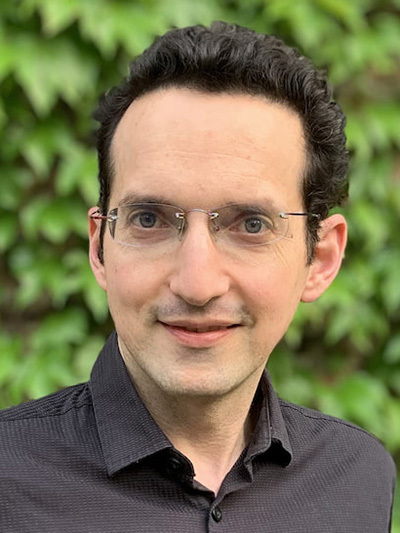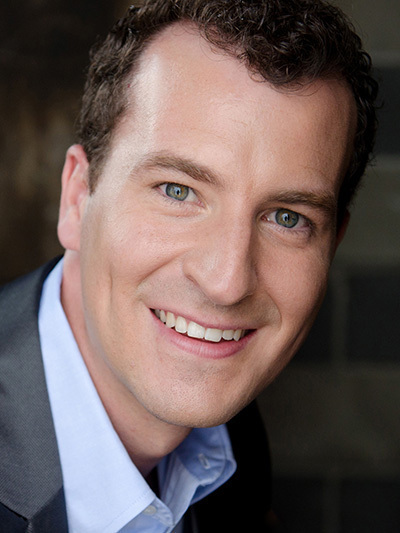Grammy Awards spotlight Notre Dame music faculty
At the 66th Grammy Awards on Sunday (Feb. 4), two faculty members in the University of Notre Dame’s Department of Music will wait to hear if their project names are called.
Daniel Schlosberg, a professor of the practice for piano, is a nominee for best classical solo vocal album, and Stephen Lancaster, an associate professor of the practice for voice, is part of an ensemble nominated for best choral performance.

The event will be a homecoming for Los Angeles native Schlosberg — who is being recognized for his work as a pianist on “40@40,” an art-song collaboration with soprano Laura Strickling. The album is the first installment of 20 pieces of a 40-song vision featuring the work of composers who are diverse in age, background and location.
“The idea was to have a lot of different voices to foster this sense of community that Laura and I both feel is essential to the genre,” said Schlosberg, who is also director of undergraduate studies for the department.
Schlosberg concentrates his research on art song, which he describes as “two artistic mediums coming together to create this hybrid form that is greater than the sum of its parts.” The genre combines poetry and musical composition to create new interpretations of both works.
He also focuses on instrumental contemporary music that is non-vocal and plays chamber music with various performers such as the Chicago Symphony Orchestra.
Schlosberg started playing piano at age 4 and describes the role of music throughout his life as “a very heightened experience.”
“It’s a way of commenting on the way we’re feeling, what’s going on in society, and many, many things,” he said. “It expresses ideas and emotions that are hard to express, complicated, or abstract.”
When he performs, he hopes audience members are emotionally provoked.
“In particular with the art-song genre — text and music — I want them to see how composers navigate and interpret the text they’ve been working with and the subtlety and intricacy that is involved,” Schlosberg said. “And I want them to be excited about art song and explore it further with other artists, composers and time periods.”

When the gilded gramophones are handed out on Feb. 4, Lancaster will be anxiously awaiting the announcement of the best choral performance award. Conductor Craig Hella Johnson is nominated for the album “House of Belonging,” performed by the large vocal ensemble Conspirare, which Lancaster joined in 2020.
The vocal ensemble won a Grammy in 2015 and has been nominated 11 times. For this album, the group rehearsed for several days and performed a live concert before making the recording.
“The more we rehearsed it, the more we loved the repertoire. And then the recording process went really well,” Lancaster said. “So, I think we all felt a sense of excitement that this was a satisfying project with music we felt strongly about. The music and poetry convey powerful messages about belonging that are meaningful to people today.”
Lancaster, who is a fellow with the Nanovic Institute for European Studies, performs both as a soloist and as part of ensembles, primarily focusing on Western classical contemporary and sacred music.
Other notable Notre Dame connections to the Grammy Awards include music faculty member Alexander Blachly, whose vocal group Pomerium was nominated for best small ensemble performance in 1999; Folk Choir director J.J. Wright, whose album “The Caribbean Jazz Project, Afro-Bop Alliance” won a Latin Grammy for best Latin jazz album in 2008; and Sacred Music at Notre Dame technology and production coordinator Daniel Stein, who was a principal player in the album “Canto América,” which was nominated for best Latin jazz album in 2017.
“It’s a major distinction for the department to receive this recognition,” said Berthold Hoeckner, the Keough-Hesburgh Professor of Music History and department chair. “As a department, we are committed to supporting and fostering creative work. These honors speak to the manner in which our faculty are leading the way in innovative and groundbreaking programming.”
Originally published by at al.nd.edu.
Latest Faculty & Staff
- In memoriam: Alasdair MacIntyre, the Rev. John A. O’Brien senior research professor of philosophy emeritusAlasdair MacIntyre, the Rev. John A. O’Brien senior research professor of philosophy emeritus and a permanent senior distinguished research fellow at the de Nicola Center for Ethics and Culture, died on May 21, 2025. He was 96.
- Santiago Schnell, dean of Notre Dame’s College of Science, appointed as provost of DartmouthSantiago Schnell, the William K. Warren Foundation Dean of the College of Science at the University of Notre Dame, has accepted an appointment as provost at Dartmouth College. He will depart Notre Dame at the end of June and begin his new role in July.
- Notre Dame’s Fightin’ Irish Battalion receives Department of Defense award as nation’s top Army ROTC programThe United States Department of Defense honored the University of Notre Dame’s Army ROTC Fightin’ Irish Battalion as the nation’s top Army collegiate program for the 2023-24 academic year. This will be the first time the unit has received the department’s Educational Institution Partnership Excellence Award, which recognizes the program’s achievements in recruiting, educating, training and commissioning leaders of character to be the next generation of military officers.
- In memoriam: Karl Ameriks, the McMahon-Hank Professor of Philosophy EmeritusKarl Ameriks, the McMahon-Hank Professor of Philosophy Emeritus at the University of Notre Dame, died on April 28 from pancreatic cancer. He was 77. Born in post-World War II Germany, Ameriks’ family emigrated to the United States when he was a child, and he grew up in Detroit, Michigan. He received his bachelor’s and doctoral degrees from Yale University. He came to the Department of Philosophy at Notre Dame in 1973 during a formative time for the department, which had transitioned from a predominantly Thomist focus to the more analytical American philosophy in the 1960s.
- Notre Dame psychologist explores how children best learn math — and yes, timed practice helpsUniversity of Notre Dame professor of psychology Nicole McNeil recently co-authored a report that examines the best way for children to learn arithmetic — whether that’s by memorizing number values and multiplication tables, or by studying math at a deeper, conceptual level. The report, “What the Science of Learning Teaches Us About Arithmetic Fluency,” was published in the journal Psychological Science in the Public Interest and shows that children learn most effectively when instruction follows an evidence‑based cycle: grounding facts in conceptual understanding, using brief timed practice to make those facts automatic, and then returning to discussion and reflection to deepen that knowledge.
- ’Tis the season for ticks and mosquitoes. A medical entomologist talks about these pests and how to avoid them.Notre Dame expert Lee Haines explains the risks mosquitoes and ticks pose to the Midwest and discusses how the public can best protect themselves and family members (including pets) from these bloodthirsty pests.












